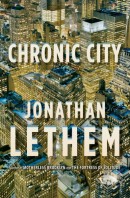A weekly roundup of noteworthy reviews from other sources.
 Bookforum has an early review of Jonathan Lethem’s latest, which goes on sale in mid-October. I’ll see for myself, but the reviewer, Hari Kunzru, is not a fan:
Bookforum has an early review of Jonathan Lethem’s latest, which goes on sale in mid-October. I’ll see for myself, but the reviewer, Hari Kunzru, is not a fan:
At times, Chronic City is almost a caricature of the type of writing James Wood skewered as “hysterical realism.” The irritating names, the hyperactive plotting, the relative lack of interest in psychology, and the general atmosphere of conspiracy and connectivity are all hallmarks of a genre that (pace Wood) vastly expanded the possibilities of the postwar novel but has now ossified into a repertoire of gestures, most of which Chronic City seems compelled to repeat.
Elsewhere, E. L. Doctorow’s latest, which imagines the life of famous New York shut-ins the Collyer brothers, also has critics considerably less than ecstatic. In the Times, Michiko Kakutani says that Doctorow has “produc[ed] a slight, unsatisfying, Poe-like story that turns out to be a study in morbid psychology.” . . . In the just-published September issue of Open Letters, Sam Sacks writes about Doctorow’s novel (“the book suffers from a want of invention. [It] feels simultaneously slight and verbose.”) along with two other New York novels, by Colum McCann and Colm Tóibín. . . . Edward Luttwak manages the rare deeply smart-and-breezy combination a review of two books, one a history of Central Eurasia and another about Attila the Hun. (“The extraordinary reputation of Attila and his Huns requires an explanation, because they had so much competition.”) He also unequivocally criticizes the inability of academics to confront important aspects of military history. . . . Christian House praises a “bibliomemoir” by British academic Rick Gekoski, who guides us on “a tour of 25 books that are particularly special to him, we learn the part each played in his romantic, professional and intellectual development.”

